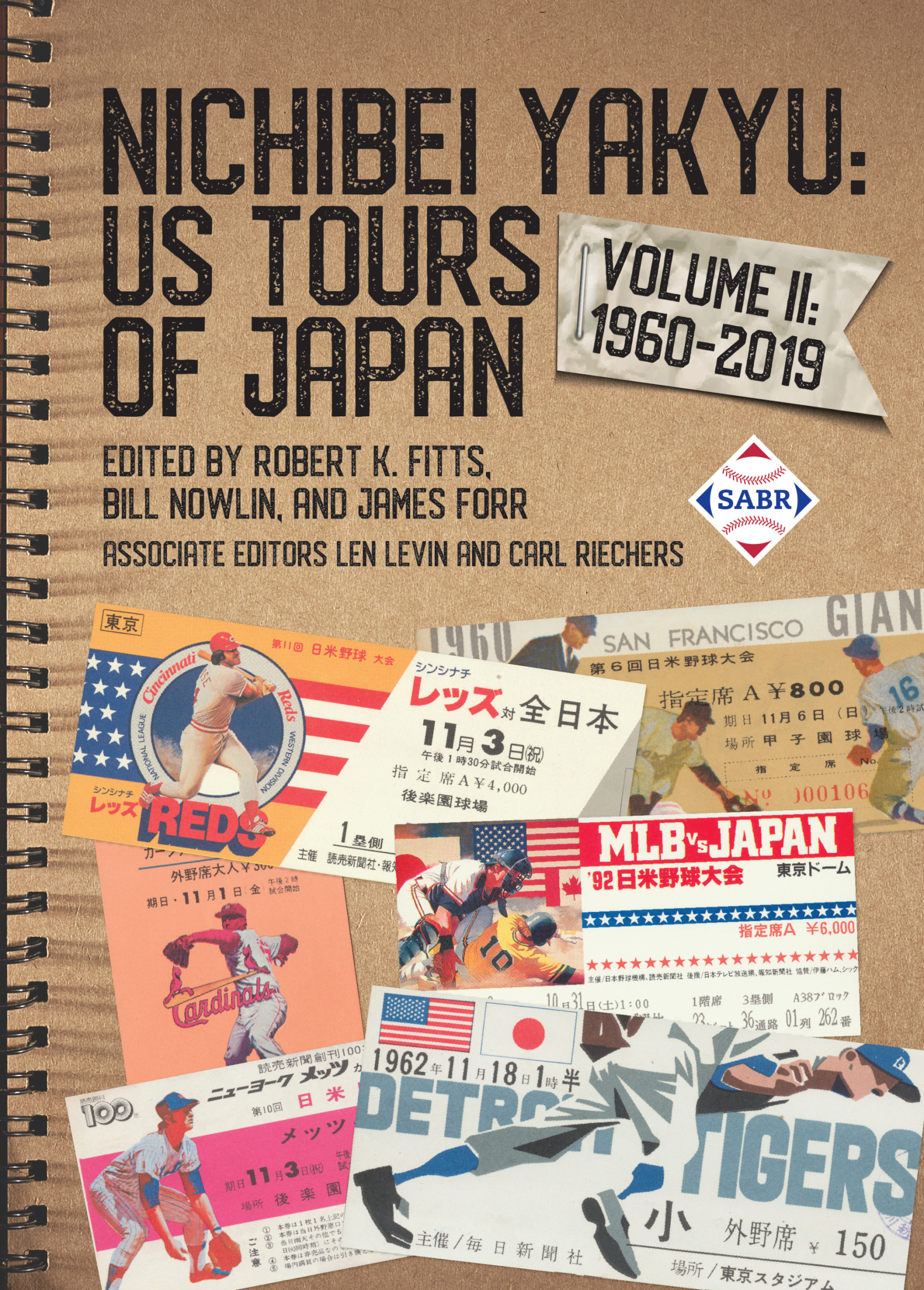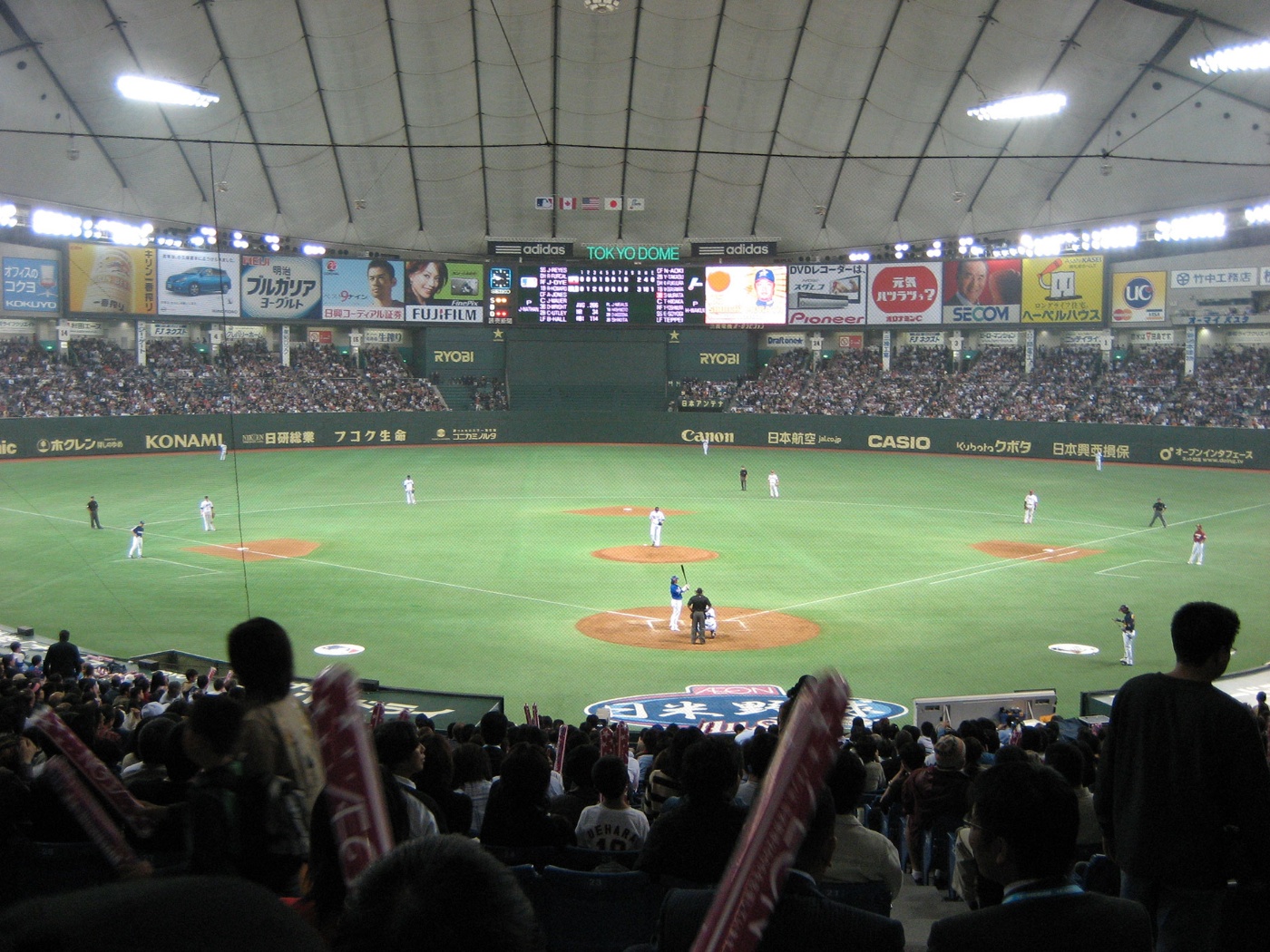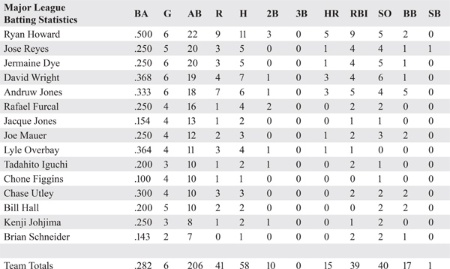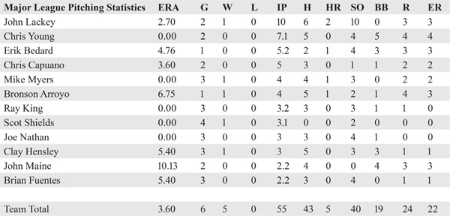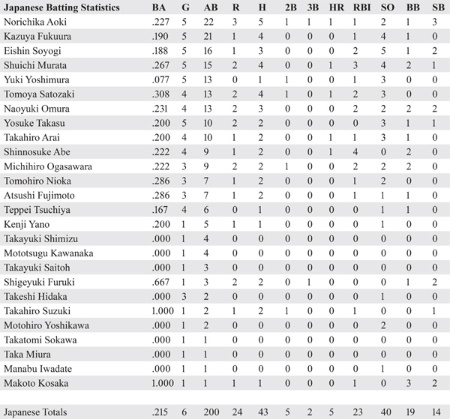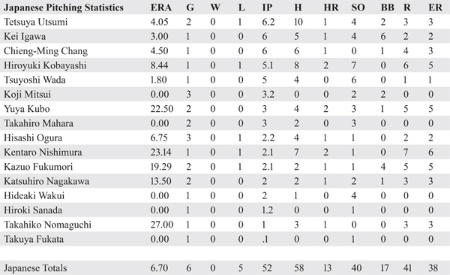End of an Era: The 2006 Aeon All-Star Series
This article was written by Coop Daley - Rob Fitts
This article was published in Nichibei Yakyu: US Tours of Japan, 1960-2019
Fans packed the Tokyo Dome for Game 1 of the 2006 Aeon All-Star Series. (Photo by Robert Fitts)
In March 2006 the Japanese national team, known as Samurai Japan, surprised the baseball world by winning the inaugural World Baseball Classic. Japan had finished second to South Korea in its pool in the preliminary round and barely squeaked through the second round after losing to both the United States and South Korea, but advanced to the semifinals over the US based on the tiebreaking criterion (fewer runs against per nine innings). Japan then dominated its opponents in the final games with a 6-0 rout of South Korea and a 10-6 punchout of Cuba in the final.
The Japanese team was filled with stars from both sides of the Pacific, including NPB’s famous slugger-turned-manager, Sadaharu Oh, and MLB’s new favorite superstar, Ichiro Suzuki, who said after the final, “I didn’t care if I got injured. That’s how much I wanted to win the championship.”1 The main storyline for the Japanese team, however, was the dominance of 25-year-old Daisuke Matsuzaka. The right-hander was considered one of the greatest pitchers in Japanese history, celebrated for his 250-pitch, 17-inning complete game in the 1998 Koshien summer tournament, the no-hitter he pitched in the championship game just a few days later, his 1999 Rookie of the Year season, his 2001 Sawamura Award, and his 2004 Japan Series Championship with the Saitama Seibu Lions. From 1999 to 2006, he led the Pacific League in strikeouts four times, wins three times, and ERA twice. At the WBC, he dominated his international opponents, posting a 3-0 record and a 1.38 ERA over 13 innings of work. The performance garnered plenty of attention from US major-league scouts.
In November 2006, a major-league all-star team planned to travel to Japan to continue the Nichibei Yakyu series. Many Japanese had high hopes that the Samurai would win the series for the first time since 1990. Tsuneo Watanabe, editor-in-chief of the Yomiuri Shimbun, wrote, “This spring, Japanese baseball players played for the honor of the county, and Japan eventually won the inaugural World Baseball Classic. To counter Japan, Major League Baseball, which has been proudly leading baseball all over the world, has organized the strongest team in the US-Japan baseball history this time around. It should be intriguing to see [the] fierce competition between MLB and NPB.”2 An MLB official said, “We have some of MLB’s best, and we are playing to win, especially after Japan won the WBC.”3
But the Japanese players did not share this enthusiasm. Many found the series redundant after the advent of the World Baseball Classic. And they resented not being paid for their participation while the visiting MLB players received bonuses for making the trip.4 In August the Japan Pro Baseball Players Union voted to not participate in future Nichibei Yakyu series after the already-scheduled 2008 event.5 “The WBC was a success, and in the future, we want games to be meaningful,” insisted union leader Shinya Miyamoto, an infielder for the Yakult Swallows. “We do not like to play games that have no meaning.”6
As a result, many of Japan’s top WBC players did not participate in the all-star series. Four of the championship team’s top five hitters were missing: Nobuhiko Matsunaka (.433/.528/.567 in 30 WBC at-bats), Akinori Iwamura (.389/.429/.500 in 18 at-bats), Ichiro Suzuki (.364/.447/.485 in 33 at-bats), and Tsuyoshi Nishioka (.355/.447/.613 in 31 at-bats). Also absent were the squad’s top three pitchers: Matsuzaka, Koji Uehara (2-0, 1.59 ERA in 17 innings pitched), and Shunsuke Watanabe (1.98 ERA in 13⅔ innings pitched).
Matsuzaka declined to participate because the Seibu Lions had just agreed to his request to be permitted join the US major leagues. The Lions announced on November 1 that they would take bids for their ace’s contract. As most scouts considered Matsuzaka to be a frontline starting pitcher, the bidding was expected to be high. Updates and rumors dominated the sports pages, at times overshadowing the all-star series.
David Wright, the visiting all-star team’s third baseman, was disappointed at Matsuzaka’s absence. “It’s understandable why he’s not playing, but sure, I was looking forward to it,” Wright said. “You want to face the best. But there’s a good chance that next year, I’ll be facing him or we’ll be on the same team. I’m excited for that.”7
Not even a week after the St. Louis Cardinals topped the Detroit Tigers in a five-game World Series, the MLB All-Stars hopped off the plane in Tokyo and began preparations for the games. Unlike previous years, the series would be limited to five games instead of eight.
Owing to the quick departure after the World Series, no member of either the Cardinals or Tigers joined the team, but this proved to be no difficulty. The NL runner-up New York Mets were well-represented with third baseman Wright and shortstop Jose Reyes manning the left side of the infield while their divisional rival Philadelphia Phillies took the other side with Chase Utley at second and Ryan Howard at first. Outfielders included Andruw Jones of the Atlanta Braves, Jermaine Dye of the Chicago White Sox, and Bill Hall of the Milwaukee Brewers. The catchers were Joe Mauer of the Twins and Kenji Johjima of the Mariners. Pitchers included Los Angeles Angels ace John Lackey, the Reds’ Bronson Arroyo, Chris Capuano of the Milwaukee Brewers, and relievers Joe Nathan of Minnesota and Brian Fuentes of Colorado.
There were also a number of role players taking advantage of the opportunity for a trip to Japan, including Mets starter John Maine. Maine had been a minor-league player just a few months before. Called up by the Mets in midseason, he posted a 6-5 record and a 3.60 ERA. Injuries to staff aces Pedro Martinez and Orlando Hernandez catapulted Maine into the Game One starter slot in the Division Series and two starts in the NL Championship Series. He rose to the occasion, pitching well in front of raucous Shea Stadium crowds, and winning Game Six of the NLCS to keep the Mets’ hopes of a World Series championship alive. Maine was not even supposed to be on the all-stars roster; he only made the team after Carlos Beltran dropped out because of a lingering injury. “That’s the way I like it, though,” Maine said of his luck. “Under the radar.”8
Wright was particularly excited about the trip, saying, “I’ve played with so many guys from Asia and the Dominican Republic that I jumped at this chance. I’ve always wanted to see what they experienced when they came over here, and now I get to put myself in their shoes. I’ll get to experience the culture, the food, everything. It’s a once-in-a-lifetime opportunity, and I’ll also get some at-bats and hopefully finish the season on a strong note.”9
After working out at the Tokyo Dome on November 1, the MLB All-Stars began their tour with a warm-up game against the Yomiuri Giants the next evening. A crowd of 32,000 watched the all-stars open the scoring in the top of the third as Rafael Furcal doubled off starter Taiwanese-born Chien-Ming Chiang to drive in Chone Figgins. The Giants responded in the bottom half of the inning as Shigeyuki Furuki led off with a triple and scored on a balk by starter Chris Young. Young then surrendered a walk, a single, a double, and two sacrifice flies as Yomiuri went ahead 4-1. The Giants added two more on Shinnosuke Abe’s two-run homer to end the fifth inning up 6-2.
Using the long ball, the Americans worked their way back into the game. Jones and Howard hit back-to-back home runs in the top of the sixth to cut the deficit to 6-4, but the Giants responded with a run in the bottom of the inning. Jones came through again with a ninth-inning leadoff homer. With the all-stars down to their final out, Mauer singled and Wright cracked a two-run shot to left, tying the game, 7-7. “I was looking for something up that I could drive, but I got a slider he left over the plate,” Wright said.10 “It felt great. [Being] given the opportunity to come here and represent Major League Baseball and do this in my first international competition was great.”11 After the Giants failed to score in the bottom of the ninth, the game ended in a 7-7 tie. “This was a great way to start the series,” MLB skipper Bruce Bochy said. “For our guys to come back like that was huge, our dugout was going nuts. We didn’t get the win but we’ll take a tie after being down three runs in the ninth.”12
Nearly 43,000 people packed the Tokyo Dome on November 3 for the first matchup between the MLB and NPB All-Stars. The Japanese crowd made their players feel right at home with the typical loud experience: songs, cheering, and plenty of revelry. It was a perfect party for the opening game, and fireworks were about to go off for both squads.
The scoring began in the second inning as Ryan Howard doubled off starter Tetsuya Utsumi. Andruw Jones singled and the runners moved up on a wild pitch before Mauer walked to load the bases with no outs and Wright coming to the plate. Utsumi regained control, struck out Wright, and then fooled Utley, causing him to lightly tap the ball in front of the plate. Catcher Shinnosuke Abe fielded it and retired Utley at first as Howard scored behind him. Utsumi ended the inning by striking out Hall. The next inning Jermaine Dye made it 3-0 “by crushing a 1-1 off-speed pitch up in the zone into the left-center-field stands.”13
The Japan All-Stars chipped away, getting a run off starter John Lackey in the fourth on an infield hit by Yosuke Takasu, a stolen base, and an opposite-field single by Michihiro Ogasawara. “I knew that John Lackey moves his balls a lot,” said Ogasawara “so I went into the batter’s box thinking about going the other way.”14
The Japanese added another run in the seventh as Ogasawara doubled with one out and Maine walked Shuichi Murata and Abe to load the bases. Yuki Yoshimura then hit a high fly to center. Maine later told Newsday reporter David Lennon that every fly ball made him nervous. “It’s weird, because every time they hit the ball up in the air, [the fans] go crazy. It could be a pop-up 10 feet out of the infield and they go crazy.”15 Andruw Jones, however, easily tracked down the fly in center field as Ogasawara scored. But that was all for the Japanese as Maine retired Tomohiro Nioka to end the inning and Scot Shields and Joe Nathan closed out the game with hitless innings for the 3-2 win.
“It was a very good ball game,” Bochy declared. “The MLB team came here and knew it would be very competitive. It’s great to see how global this game has become. It’s great for baseball.”16 Japanese All-Stars manager Katsuya Nomura believed the night highlighted the growing skill and power of Japanese baseball: “I’ve been in this game for 50 years. I’ve taken part in this series several times and it used to be there was a huge gap in the level of play, but it’s closing and we had a very good chance of winning this ballgame tonight.”17
With the crazy environment of a Japanese crowd, the NPB All-Stars creeping up on their MLB counterparts, and a long ball proving to be the difference-maker, the opening game was almost a perfect encapsulation of what was to come.
After winning the 2005 NL Rookie of the Year Award, Ryan Howard captured MVP honors in his second season, smashing 59 home runs and knocking in 149 runs. When Howard headed to Japan with the MLB squad, he was seen as the next wave in phenomenal talent: a home-run hitter for a home-run-loving crowd. “Ryan Howard will not be permitted to set foot in Japan,” one Philadelphia sports columnist wrote. “The power-worshipping fans of a nation where Littleball is a fact of life and home-run hitters are venerated might be taken captive. If Hideki Matsui was nicknamed ‘Godzilla,’ what would Howard be, ‘Mothra?’”18
In the second game of the series, Howard revealed just how monstrous he could be. He put the MLB All-Stars on the scoreboard in the second inning with solo home run off starter Kentaro Nishimura. The line drive just cleared the center-field wall by a few feet. “It was an outside fastball and I was able to get a good swing at it,” Howard said. “I drove it over the fence the other way and it was good to get my team on the board.”19 As he “crossed the plate, a tiny boy and girl dressed in traditional kimonos bowed and handed him a small bouquet of flowers.”20
In the next inning, Howard broke a 2-2 tie with a majestic two-run homer, which came within inches of scraping the top of the dome before landing an unofficial 450 feet away in the center-field bleachers. Watching his own work for a moment, he took a few steps toward first, then pointed toward the flower-presenters, expecting an encore. “I guess they should have given me a whole bouquet for that one,” Howard said.21
While Howard may have gotten the accolades, it was another player’s special night in Tokyo. White Sox second baseman Tadahito Iguchi, who had left the Fukuoka Daiei Hawks in 2005, returned to Japan with the MLB All-Stars. He was looking to make a splash for his American teammates when he took to the batter’s box in the third inning with two runners on and a chance to break the game wide open. Known for both his speed and power – he stole 15 bases and hit 15 home runs in 2005 – Iguchi was a key player on Chicago’s championship team. With runners on the corners, Iguchi doubled down the left-field line, knocking in both runners, as the Japanese crowd roared for their hometown star.
Over the next four innings, the Japanese chipped away at the Americans’ 7-2 lead. In the bottom of the third, Tomoya Satozaki homered to cut the deficit to 7-4. In the seventh, they added another two on a walk to Naoyuki Omura, a double by Norichika Aoki, and a single by Eishin Soyogi. A solo home run by Kyle Overbay in the eighth gave MLB some breathing room as Brian Fuentes pitched a perfect ninth inning to save the 8-6 victory.
The barrage of home runs continued the next evening in Game Three at Tokyo Dome. Aoki, one of NPB’s greatest hitters, led off the game against Erik Bedard. As a rookie in 2005, Aoki had become the first Central League player to get 200 hits in a season as he won the league’s batting title and the Rookie of the Year Award. The eight-time NPB All-Star won three batting titles during this 13-year and counting NPB career (Aoki was still active in 2022 and holds the NPB record for the highest career batting average.) From 2012 to 2017, he played for seven US major-league teams, hitting .285 in 2,716 at-bats. Aoki began the game by hammering the first pitch, a low fastball down the middle, over the right-field wall to give the NPB All-Stars their first lead of the series.22
Facing right-hander Hiroyuki Kobayashi, the MLB team had trouble getting their offense started; the 6-footer held them hitless through the first four innings. Howard, however, doubled off the center-field wall in the fifth to break up the perfect game. One out later, American League batting champion Joe Mauer’s home run to put his team up, 2-1. “Koboyashi [was] pitching a real good game,” noted Mauer. “He left the ball over the plate, and I was able to drive it.”23 Singles by Overbay, Wright, and Jacque Jones extended the lead to 3-1.
The Japanese All-Stars fought back, tying the game, 3-3, in the top of the sixth, before the Americans broke the game open in the bottom of the same inning on a two-run homer by Andruw Jones. To put the icing on his Tokyo cake, in the seventh Ryan Howard smacked a three-run homer off the auxiliary board in right field, putting the Americans up 10-4 and all but sealing the deal. “I’m feeling real good about playing in Japan,” said Howard. “The balls are jumping off my bat here and I hope to keep up the good work.”24 The MLB team went on to win, 11-4, as Wright hit a solo home run in the eighth.
Just as in the regular season, Wright had played second fiddle to Howard for the first three games of the tour. Wright came into the fourth game, played on November 7 in the Osaka Dome, looking to make his splash on the series. Facing Wright and his teammates was Hanshin Tiger ace Kei Igawa. Like Matsuzaka, Igawa had announced his desire to play in the majors and had asked the Tigers to post his contract after the series. Although he was not considered as talented as Matsuzuka, he was also garnering attention from US scouts. The left-hander had won both the 2003 Sawamura Award and Central League MVP Award and led the league in strikeouts three times. “He’s got a good changeup, man – nasty,” Jose Reyes told reporters. “And he can throw the ball. He throws 92, 93 MPH.”25
Perhaps nervous during this unofficial “tryout,” Igawa looked shaky, walking Reyes to lead off the game and surrendering a single to Rafael Furcal before getting out of the inning. Over six innings, he allowed two runs on five hits and six walks while striking out four. “I wasn’t really satisfied with my pitching tonight,” Igawa said. But he was pleased that he had held Ryan Howard hitless in three at-bats. “Because Ryan is my age, I didn’t want to give up any hits. I did all right against him, but I gave up hits to the other guys.”26
As Howard struggled, Wright homered in the fourth inning to put his team up 2-0. “I was looking for a fastball, but I was able to adjust to his slider. … I was able to pull it out of the park,” Wright said.27 “It feels good – especially the way I scuffled a bit during the NLCS – to finish the season on a positive note, come out here and feel pretty decent at the plate, hit some home runs, and get that confidence going into the offseason. But, also, we’re over here to win. We’ve got a good team. You have to feel like you’re doing your part.”28
If anyone needed to do his part, however, it was Wright’s teammate John Maine. Maine entered the game in the sixth inning with the 2-0 lead, but – having already suffered from the intensity of Japanese stadiums – seemed shaken in the covered dome. He gave up an RBI single to Shuichi Murata and a sacrifice fly to Shinnosuke Abe, allowing the NPB All-Stars to tie the score at 2-2 before he left the game after recording just two outs. Mike Myers recorded the final out and pitched a scoreless seventh.
With the score still knotted in the eighth, Bochy needed a spark from the MLB dugout. The usual suspect came through as Howard hit a one-out solo home run over the outfield wall off reliever Kazuo Fukumori to put the Americans back on top for good. “I was just trying to make contact and the ball went out,” said Howard. “This has been a lot of fun. I know the Japanese fans like it and I’m enjoying it.”29 The home run unhinged Fukumori and sparked a five-run eighth for the Americans – capped by a two-run single from Reyes – as the MLB All-Stars cruised to their fourth win of the series.
Once again outshined by Howard’s dominance, Wright didn’t seem to mind; if anything, he was more impressed than ever. “I tried to stay neck-and-neck with him in the [MLB All-Star Game’s] Home Run Derby, and he wore me out,” he said. “I’m not going to even try to do that. He’s tremendous. He’s one of a kind. So I’m not going to even try to keep pace with him, home run for home run. I can’t do it.”30
There was still one more game to play, and a chance that the MLB All-Stars could sweep the series for the first time since its inception in 1986. Boarding a plane to Fukuoka for the final game, only one player was sent to sit in coach as the rest flew first-class: John Maine. When asked why, he quipped, “Did you see the way I pitched?”31
In the final game in Fukuoka, home of the Hawks, one of Japan’s most storied franchises, the Japanese team sent out local product Tsuyoshi Wada. The Fukuoka Daiei Hawks’ left-hander was the recipient of the 2006 “Golden Spirit” award, given to the NPB player who best “exemplifies the game of baseball, sportsmanship, community involvement and the individual’s contribution to his team.”32 Playing in his home ballpark, Wada pitched with an absolute fire in his belly, taking a perfect game into the fifth inning.33
The Japanese jumped out to a 2-0 lead in the fourth inning as Takahiro Arai and Shuichi Murata hit solo home runs off starter John Lackey. “I grew up in Fukuoka, so it’s nice to get a hit in my hometown,” Murata said. “Their pitchers throw hard, and they can pitch to all corners, so I’m learning a lot by facing them.”34 But once again, Howard jump-started the MLB offense by breaking up Wada’s no-hit bid with a single to lead off the fifth and scoring on a single by Kenji Johjima. The next inning, Howard doubled with two on to tie the game before an Andruw Jones sacrifice fly put the Americans ahead, 3-2.
The Japanese, however, did not fold. With two outs in the ninth and runners on, Naoyuki Omura, right fielder for the hometown Hawks, singled to left to tie the game. After a scoreless bottom of the ninth, for the first time in the series the game went to extra innings.
The NPB All-Stars threated in the top of the 10th as Kazuya Fukuura singled with two outs off closer Joe Nathan and Tomoya Satozaki followed with a ground-rule double. Bochy turned to Scot Shields who retired Murata on a fly to right field to get out of the inning.
In the bottom of the inning, Bill Hall began with a single off Hisashi Ogura. That brought up one of the Mets’ newest stars, José Reyes. Reyes had had a rough series. He was just 4-for-17 (plus 0-for-2 against Yomiuri) and he had not hit a home run. “When he hits a home run, he lets everybody know about it,” said Wright. “So after I hit my first couple, I was giving him a hard time about having no home runs.”35 Coming to the plate in perhaps his biggest opportunity of the tour, he was almost denied a chance to swing. “We got Hall on, and we thought maybe for a moment we were going to let [Reyes] bunt,” third-base coach Manny Acta said after the game.36
And then, “He just does his thing,” Acta said, “very José-like.”37
Reyes sent a first-pitch fastball over the right-field fence, sending the Dome into a pure frenzy. Emulating the soccer-like chants from other regions, the fans chanted his name in an endearing rhythm. “When I heard my name – ‘Jo-sé, Jo-sé’ – I felt like I was playing in Shea Stadium,” Reyes said of the home run. “It was exciting for me.”38
“I actually thought we were in Shea Stadium. I heard it way too much this year,” Howard said of the chants ringing through the dome. “It just goes to show you that baseball transcends just where we are. It’s global.”39
A series that had been defined by role players and superstars, tight finishes and home runs, rowdy crowds and uniting chants came to a close with a final “sayonara” blast. Howard was named series MVP and the players headed back home. A month later Matsuzaka came to terms with the Boston Red Sox. Not to be outdone, the Yankees signed Kei Igawa in late December. Akanori Iwamura, Hideki Okajima, and Masumi Kuwata also signed major-league contracts for the 2007 season.
The MLB squad had become the first American team to sweep their Japanese counterparts since the 1955 Yankees. “We came all the way over here from the United States to win,” exclaimed Reyes after his sayonara home run.40 Although the sweep provided some revenge for Japan’s victory over the United States in the inaugural World Baseball Classic, it did not help Japan-American baseball relations. The NPB players union continued with its decision to boycott future Nichibei Yakyu exhibitions. It would be eight years until the US-Japan series restarted under a new format.
COOP DALEY is the secretary of SABR’s Asian Baseball Committee and a graduate of the Medill School of Journalism at Northwestern University. His work has been featured at JapanBall, North by Northwestern, and more, and has been nominated for several Society of Professional Journalists Mark of Excellence awards.
ROBERT K. FITTS is the author of numerous articles and seven books on Japanese baseball and Japanese baseball cards. Fitts is the founder of SABR’s Asian Baseball Committee and a recipient of the society’s 2013 Seymour Medal for the Best Baseball Book of 2012 (Banzai Babe Ruth); the 2019 McFarland-SABR Baseball Research Award; the 2012 Doug Pappas Award for the best oral research presentation at the annual convention; and the 2006 and 2021 SABR Research Awards. He has twice been a finalist for the Casey Award and has received two silver medals at the Independent Publisher Book Awards. While living in Tokyo in 1993-94, Fitts began collecting Japanese baseball cards and now runs Robs Japanese Cards LLC. Information on Rob’s work is available at RobFitts.com.
(Click images to enlarge)
Notes
1 Barry M. Bloom, “Japan Crowned Classic’s First Champ,” MLB.com, March 21, 2006. https://web.archive.org/web/20070528031322mp_/http://ww2.worldbaseballclassic.com/2006/news/recap.jsp?ymd=20060320&content_id=1357183&gameid=2006_03_20_jpnint_cubint_1&sid=wbc.
2 Aeon Nichibei Yakyu 2006 All-Star Series Program (Tokyo: Baseball Magazine, 2006): 5.
3 Stephen Ellsesser, “WBC, Nichibei on Collision Course?” Japan Times, November 2, 2006: 22.
4 Stephen Ellsesser, “Valentine Critical of All-Star Series,” Japan Times, September 6, 2006: 18.
5 Wayne Graczyk, “JPBPU Should Consider Rich History of Nichi-Bei Yakyu,” Japan Times, August 6, 2006: 19.
6 Ellsesser, “WBC, Nichibei on Collision Course?”
7 Ben Shpigel, “Wright’s Excellent Adventure to Continue in Japan,” New York Times, October 29, 2006: H3.
8 David Lennon, “Very Fortunate: What It Means to Be John Maine,” Newsday (Long Island, New York), November 5, 2006: B4.
9 Shpigel.
10 Stephen Ellsesser, “Unheralded Giants Big in Tie,” Japan Times, November 3, 2006: 12.
11 Associated Press, “Wright, MLB Stars Tie,” Wilkes-Barre (Pennsylvania) Times Leader, November 3, 2006: 9B.
12 Associated Press, “Wright, MLB Stars Tie.”
13 Ed Odeven, “MLB Stars Edge Win,” Japan Times, November 4, 2006: 23.
14 Odeven, “MLB Stars Edge Win.”
15 Lennon, “Very Fortunate.”
16 Odeven, “MLB Stars Edge Win.”
17 Associated Press, “Dye’s Homer Lifts MLB All-Stars Over Japan,” Sioux City (Iowa) Journal, November 4, 2006: B6.
18 Bill Conlin, “Howard a One-Man Tour de Force in Japan,” Philadelphia Daily News, November 7, 2006: 63.
19 Jim Armstrong, “MLB Goes Up 2-0 on Pair of Howard Blasts,” Japan Times, November 5, 2006: 20.
20 Conlin.
21 Conlin.
22 Ed Odeven, “MLB All-Stars Power Past Japanese,” Japan Times, November 6, 2006: 20.
23 Associated Press, “Howard Blasts Another HR as MLB All-Stars Rout Japan,” ESPN.com, November. 5, 2006. https://www.espn.com/mlb/news/story?id=2650329.
24 Associated Press, “Howard Blasts Another HR as MLB All-Stars Rout Japan.”
25 Adam Rubin, “Wright Stuff Rises in Japan,” New York Daily News, November 8, 2006: 92.
26 Stephen Ellsesser, “Howard’s Blast Sparks MLB,” Japan Times, November 8, 2006: 20.
27 Associated Press, “Howard Goes Deep Again as MLB All-Stars Sock Japan,” ESPN.com, November 7, 2006, https://www.espn.com/mlb/news/story?id=2652434.
28 Rubin, “Wright Stuff Rises in Japan.”
29 Associated Press, “Howard Goes Deep Again as MLB All-Stars Sock Japan.”
30 Rubin, “Wright Stuff Rises in Japan.”
31 Rubin, “Wright Stuff Rises in Japan.”
32 Sports Hochi, “Awards for Social Contribution Activities of Professional Baseball Players,” Hochi, December 16, 2021. https://hochi.news/articles/20211215-OHT1T51227.html?page=1.
33 “Reyes Walk-off HR Completes MLB Sweep of Japan,” ESPN.com, November 8, 2006, https://www.espn.com/mlb/news/story?id=2653700.
34 “Reyes Walk-off HR.”
35 Adam Rubin, “Reyes Ends with a Blast,” New York Daily News, November 9, 2006: 98.
36 Rubin, “Reyes Ends with a Blast.”
37 Rubin, “Reyes Ends with a Blast.”
38 Rubin, “Reyes Ends with a Blast.”
39 Rubin, “Reyes Ends with a Blast.”
40 Stephen Ellsesser, “Reyes leads MLB to Sweep,” Japan Times, November 9, 2006: 22.
41 These tables include all participants in the series and include the game against the Yomiuri Giants. Nippon Professional Baseball Records, https://www.2689web.com/nb.html; Nippon Professional Baseball, Official Baseball Guide 2007 (Tokyo: Kyodo News, 2007), 324-26; “Nichibei Yakyu 2006,” https://npb.jp/bis/scores/japanvsfor/linescore2006.html.


